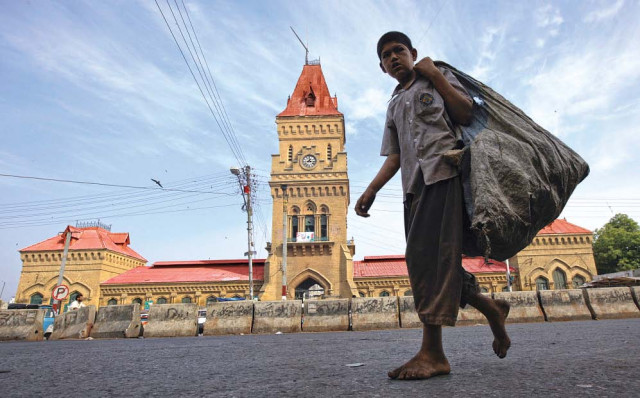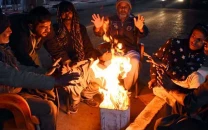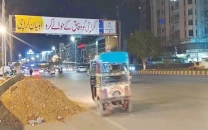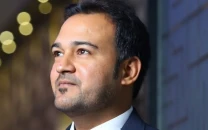KMC to mark Preedy Street for pedestrians but not sure how
The traders and transporters are adamant on resisting the move.

Even though Sindh government and Karachi Metropolitan Corporation (KMC) are planning to remove all the stalls, pushcarts and roadside vendors in Saddar, for now life in this market is pretty much unmoved.
Just two days earlier, Commissioner Roshan Ali Shaikh presided over a meeting to chalk out a plan to clear out the streets. On Sunday, vendors, Muhammad Qasim, Muhammad Aleem, Kaleemullah, Rafiq and Hakeem Khan were all busy wooing customers to their pushcart stalls of dried fruit, juices, everyday use items, toys, coconuts and second-hand shoes.
“It’s a matter of life and death,” says 27-year-old Qasim, who has been selling a summer drink made from kashkaash (poppy seeds) right in front of the Empress Market for 15 years. The men who work in the nearby markets, stop by to quench their thirst on their way to work. “Things have always been like this. I will be out of business if I am moved from here.”
Kaleemullah was not excited about moving either. “I have five kids to feed. Isn’t it nice that I don’t steal and rob people to feed my family?” he asks. “No one bothers me here. No one threatens me or takes money. Why should I go somewhere else?”
The ‘plan’
The civic authorities want to remove all encroachments from Preedy Street and its connecting roads because they hinder the flow of traffic. But, no one is sure how.
Preedy Street passes through the busiest markets of the city. Along its way, it also intersects Daudpota Road and Zaibunnissa Street. Except for days when the city is shut down it is crowded with thousands of roadside businessmen.
According to commissioner Shaikh, the plan is still in the making. “Right now we are at the initial stage and are taking all the stakeholders on board.”
However, this is not entirely correct. In the meeting held at his office on Friday, only a handful of traders were invited. Even the South deputy commissioner, Mustafa Jamal Qazi, was irked when he was approached for comment. “I don’t know anything about the plan to clear the roads,” he said. “I wasn’t invited to the meeting.”
The decision was made after Sindh Governor Dr Ishratul Ebad issued orders. The authorities say that people will keep parking their cars and motorcycles on the roads till the entire area is marked only for pedestrians.
The May 12 effect
The riots of May 12, 2007, when more than 45 people were killed on the city’s streets, changed Saddar, especially in the areas around Empress Market.
According to Mehdi Muhammad, a representative of the Hawkers Ittehad Baradri, since May 12, many Pakhtun people have moved their businesses to this area from other parts of the city. “The people look for security and tend to work in ethnic clusters,” said Mohammad. “But there is no enmity between the hawkers. We stand together. We will fight together.”
Every Pakhtun trader The Express Tribune spoke to said that the ‘so-called’ encroachments should also be removed from other areas like Lalukhet and Burnes Road.
Not the first time
Mehdi Muhammad of the Hawkers Ittehad Baradri said that this was not the first time the authorities had attempted to remove the hawkers. “We have seen this so many times. No one can remove us.”
Two years ago when the City District Government Karachi bulldozed the roadside stalls, the traders had blocked the roads in protest. The next day the operation was called off.
But Mehdi Muhammad also said that no one approached his association for their say in the matter.
“There are 3,000 stalls only in the area between Rizvi Shaheed Road and Abdullah Haroon Road. How can anyone remove us without asking what we want?”
The scheme also aims to change the routes of public buses. But again, Karachi Transport Ittehad’s Irshad Bukhari warned against the move. “This is outrageous. They [KMC] have not got in touch with us and are deciding the routes themselves. We will not let this happen.”
The authorities have tried to seek help from political parties but no one could persuade the traders. Naseebullah Achakzai, a leader of the Pakthunkhwa Milli Awami Party in the area, said that things are not in their control. “You will find people from different ethnic backgrounds in Saddar. Even if a few traders listened to a political party they will demand jobs in return. What will we do then?”
Published in The Express Tribune, April 9th, 2012.



















COMMENTS
Comments are moderated and generally will be posted if they are on-topic and not abusive.
For more information, please see our Comments FAQ